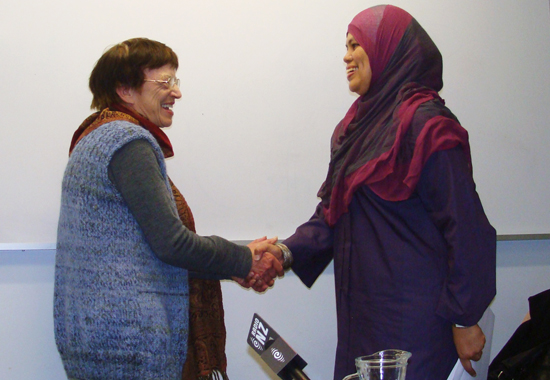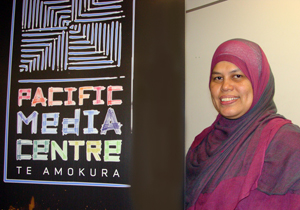
Mainstream and traditional interpretations of sharia law can and should be changed to ensure equality and justice for all Muslims, says a Muslim women’s rights activist.
Speaking at a Muslim Women’s Rights are Human Rights public forum organised by the Umma Trust in association with the Pacific Media Centre at AUT University, Ratna Osman called for a progressive interpretation of Islam that recognised women’s rights. She also appealed for the acceptance of “the concept of family as a place of security, harmony, support and personal growth for all members”.
She also appealed for the acceptance of “the concept of family as a place of security, harmony, support and personal growth for all members”.
Osman, acting executive director of Malaysian women’s rights advocacy group Sisters in Islam, used readings from the Qur’an, the central religious text of Islam, to support her argument for women’s rights in Muslim societies.
Explaining the difference between sharia, laws based on divine word of god, and fiqh, a human construct or interpretation of sharia, Osman told about 60 people at the forum that “fiqh is not God’s word. It can be amended, it can be changed”.
Osman told the group that Islam was the earliest religion to emancipate women, outlawing female infanticide and giving women other rights – such as the right to hold contracts, to choose who they marry, and to divorce, among others.
She addressed issues that relate to women’s rights in Islam such as polygamy, child marriage, domestic violence, and lack of autonomy faced by many women living in traditional Muslim families or societies.
Equality examples
According to Osman, examples can be found within the Qur’an that advocate for justice and equality between Muslim men and women.
She called for a revision of normative beliefs that acknowledged “what is divine and what is with human interpretation”.
Osman described “resurgent Islamists” who were “in the mainstream and propagating the patriarchal” interpretation of Islam as creating a sense of fear around discussing women’s rights.
She said women’s rights were often rejected by conservative Islamics as a “Western agenda” and that conservative leaders often suppressed dialogue about women’s rights by labelling it “‘too sensitive a subject”, a practice challenged by the Sisters of Islam and other progressive Islamics.
“It actually can be challenged, because which Muslim society are you representing? Because certainly it is not all Muslims who are sensitive about…women’s rights,” said Osman.
Osman called for a “critical re-evaluation” of the interpretation of religious texts, one that moves away from “the ultra-conservative, literal and narrow interpretation of the sharia”.
According to Osman, the benchmark of interpretations of Islam should be justice, a human right that Islamic women are, at times, denied by conservatives.
Compelling argument
She claimed that social issues arose when interpretations did not “look towards justice”.
People at the forum were varied in their cultural and religious background, but the general consensus was that Osman had presented a compelling and rational argument for progressive interpretations of Islam.
Muslim doctoral student Kishwer Sultana attended the event with her husband Syed Ali Ather, and both were positive about Osman’s message.
“It’s quite emancipatory for women”, said Sultana. “A lot of work still needs to be done for women in Islam… I appreciate the work and I like this.
“I want other women to enjoy the same privileges of being free and having all the rights – human rights and women’s rights”.
Ather agreed, saying: “I think it’s quite good to get a women’s point of view on things. I got some understanding from a women’s perspective.”
“I think before the session I was thinking, you know, I am doing her [his wife], a favour, but now I’ve come to know that it is her right, and my duty!” he joked.
Non-Muslim benefit
Shasha Ali, a youth coordinator for Shakti Legal Advocacy Group, felt the forum provided a much-needed discussion on Islam for non-Muslim New Zealanders.
“I think it’s always positive to have this kind of discussion and I think in New Zealand it’s a really good first step towards educating the public and the masses, really, about how these kind of things can be deconstructed when you have discussions like these,” she said.
Chief Commissioner of the Human Rights Commission Rosslyn Noonan commented that dialogue like Osman’s was important to New Zealand’s multi-cultural society.
“Ratna’s presence in New Zealand is important as we work to build a society that recognises diversity as a treasure, richness, not as a weakness in society,” she said.
“The struggle for true equality between men and women, between diverse groups in New Zealand is an on-going one,” she said.
But it was a journey that was “helping us break down stereotypes, because as with… any of the great religions, Islam is incredibly diverse”.



